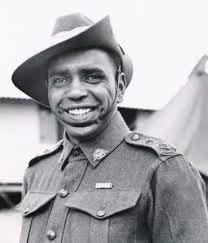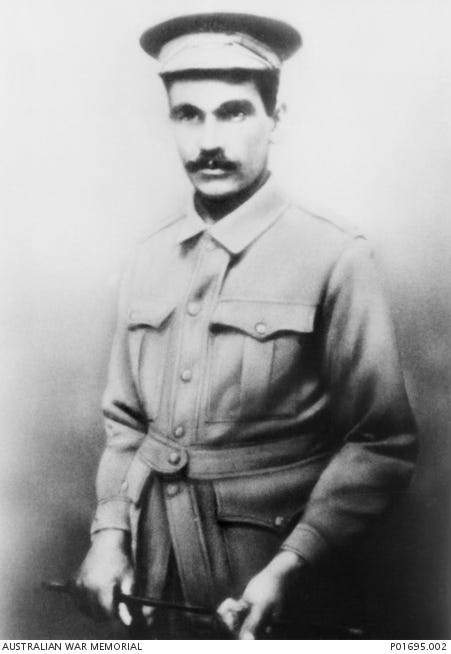The Ecosystem of Hate
How the booing of the Welcome to Country at the shrine was inevitable in the current climate
Anzac Day has always walked a fine line. On one side that line stands communal gathering, a solemn reminder of the sacrifices made by Australians in times of war, a time to remind ourselves about the futility of war. A day when the nation pauses to honour the bravery and commitment of those who served.
However, yesterday at Melbourne's Shrine of Remembrance, we were reminded about the other side of the line. The side where commemoration breaks away into concocted nationalism. A metastasised version of history and national identity, spread by trumped up misfits who, through series of wrong turns and pot holes in which to bury their wilful ignorance – they choose to idolise Adolf Hitler more than they do Weary Dunlop.
It was during the dawn service, as Bunurong elder Uncle Mark Brown delivered the Welcome to Country, that a small group led by known neo-Nazi Jacob Hersant, a plank of petrified driftwood that washes up under the glare of the national spotlight from time to time. He and small group of fellow travellers, not a medal among them, chose to disrupt the ceremony with boos and racist remarks, in an attempt to shout down Uncle Mark’s welcome.
Their actions were met with immediate condemnation from attendees and political leaders alike, including from afar Prime Minister Anthony Albanese and Opposition Leader Peter Dutton, who labelled the behaviour as abhorrent and un-Australian. Hmmm.
A new low though it is, this incident isn't isolated. It’s the sharp end of a broader political climate where certain figures and parties actively work to erode the respect and recognition afforded to First Nations people. In recent years, there’s been a steady drumbeat from the so-called “culture warriors,” framing Welcome to Country ceremonies, Acknowledgements of Country, and indeed Indigenous recognition itself, as divisive and unnecessary. These voices have grown louder, more emboldened, and increasingly well-funded. They are part of the same the well lubricated apparatus installed to defeat the referendum on the Voice in 2023.
Through algorithms, bots and AI, they run 24 hours a day, seven days a week to propagate fear, envy and their narrow view of Australia to the aggrieved and aggravated. Leaders like Dutton may have toned down their rhetoric in front of the cameras, but his has a virtual army dishing out scaremongering, paranoia inducing propaganda like confetti over the electorate as proxy.
The machine has its spokespeople. Senator Jacinta Nampijinpa Price, a central figure in this choir, has publicly labelled Welcome to Country ceremonies as a waste of money and divisive, suggesting Australians don’t need to be welcomed to their own country. It’s a well-worn line, designed to stoke grievance and undermine one of the few formal acknowledgments of First Nations' enduring connection to this land. A generous gesture from a community that well within its right not to welcome anyone at any time.
In seeking to demonise the ceremony and the people that conduct then, Price not only dismisses the cultural significance of such observances but also feeds the narrative that underpins the kind of loathing we saw spill out at in the cool pre-dawn air at the Shrine.
Adding to this disharmonious chorus is Advance Australia - a political lobbying group with deep ties to the Liberal Party. Advance has launched aggressive campaigns against Welcome to Country ceremonies, framing them as divisive and un-Australian.
In their communications, they claim that such ceremonies are part of a secretive agenda by 'elites' to delegitimise Australia's history and place in the world. Their messaging suggests that these acknowledgments are designed to make Australians feel unwelcome in their own country, a narrative that ignites and emboldens division and resentment.
Despite their portrayal as a grassroots movement, Advance is heavily funded by billionaires, wealthy donors and has received significant financial support from the Liberal Party, including a $500,000 contribution via the Cormack Foundation.
Standing proudly at the frontlines of this campaign against inclusion is Clive Palmer’s latest political vehicle, the Trumpet for Patriots—a party whose platform reads like a blueprint for exclusion. Trumpet for Patriots openly opposes Welcome to Country ceremonies and proposes to cut immigration by 80 percent, draping its policies in the language of "preserving Australian values." Yet beneath that thin veneer lies a dog whistle to the far-right, white nationalist base. Their slogans like “We don’t need to be welcomed to our own country”—are cut from the same cloth as the heckles that rang out at the Shrine of Remembrance.
Mainstream media outlets are complicit. Taking advertising dollars from Palmer’s hands and giving his party’s divisive agenda prime real estate on its front pages and banners on its websites. Broadsheets, tabloids, radio shock jocks, prime-time TV—they’re not just bystanders; they’re paid participants in spreading his nationalist propaganda. Every ad they run, every slogan they amplify, builds the scaffolding for the kind of behaviour we saw at the Shrine. It normalises the feeble blaming of others for all that’s wrong in the world and gives voice to the blamers who want to shout it. They know exactly what they’re selling and yet they sell it anyway.
We’ve seen this before. The groundwork is laid in carefully coded language—"concerns about immigration," "political correctness gone mad," "divisive identity politics" and their favourite - “wokeism”. The amplifiers, including some of the country’s largest media outlets, are paid handsomely to repeat these lines until they pass as common sense. And at the end of that chain stands someone like Hersant, emboldened to step forward at the Shrine and spew vitriol during a moment of collective remembrance.
This is the ecosystem of hate. From the Parliament to the press to the streets. The disruption at the Shrine didn’t happen in a vacuum. It is, in many ways, a logical outcome of the steady mainstreaming of far-right rhetoric in Australia, made palatable by sanitised political soundbites and monetised by media corporations, traditional and new, all too eager to bank the profits.
The irony of it all couldn’t be more cutting. Anzac Day marks the sacrifices of those who stood against fascism, against tyranny. And yet, in 2025, neo-Nazis felt emboldened enough to heckle an Elder during a solemn ceremony—hijacking the memory of those who fought against precisely the kind of hate they represent. They defiled a day meant to honour all who served, including Aboriginal and Torres Strait Islander servicemen and women whose courage and sacrifice have been systematically ignored for generations.
More than 1,000 Aboriginal and Torres Strait Islander people served in the First World War, despite laws at the time explicitly barring them from enlisting. They volunteered anyway. Men like Private Richard Martin, a Kalkadoon man from Queensland who fought at Gallipoli and on the Western Front. Or brothers Roland and Bertie Carter, Noongar men from Western Australia, both of whom served in France and suffered the horrors of trench warfare.
In World War II, over 3,000 Indigenous Australians stepped forward. Some did so out of patriotism, others because they believed service might bring recognition or equality. Among them was Len Waters, Australia’s first Aboriginal fighter pilot, who flew 95 missions over the Pacific in his Kittyhawk fighter plane. Or sisters Kathleen and Margaret McGinness, who served in the Australian Women’s Army Service, breaking ground for Indigenous women in the military.
But when the guns fell silent, their fight wasn’t over. Many returned to the same Australia that had denied their rights before they left—shut out of soldier settlement schemes, barred from RSL clubs, refused the same repatriation benefits their non-Indigenous brothers and sisters-in-arms received. They fought for a country that refused to fight for them.
These aren’t footnotes. These are central chapters in the story of Anzac. To boo a Welcome to Country at the Shrine is to spit on the memory of every Aboriginal digger who laid down their life for this nation. It’s a deliberate act of historical erasure, one that echoes the silencing these soldiers faced upon their return.
The truth is, the hecklers at the Shrine were not an aberration; they are part of the long, bitter thread that runs through this country’s history—a thread that refuses to recognise the full truth of who we are. But history remembers. whether we choose to or not. The names of Percy Pepper, Reg Saunders, Daniel Cooper, Billy James, Harry Thorpe, Kathleen McGinness, and thousands of other Aboriginal servicemen and women are woven into the fabric of Anzac. Long after the noise-makers fade, their stories endure.
If there’s any takeaway from this shameful episode, it’s that the fight against fascism didn’t end in 1945. It’s here, now, playing out in the spaces where we gather to remember. The Anzac spirit and the memory of why we have been at war either for actual national defence; or for the folly of appeasing empires, isn’t theirs to twist. It belongs to all who served, all who sacrificed, and all who stand up to hatred today.
If we’re serious about honouring the legacy of those who fought for this country—Black and white alike—then it’s on us to confront this rising tide of hate, to refuse its normalisation, and to call out every dog whistle for what it is: a threat to the very ideals that we, as a nation, like to think we uphold.








Thank you again Daniel. Peter Dutton’s comments will have Herzant crowing at his success. This is the time for all of us speak out as you suggest
Well done,Daniel. Play on.